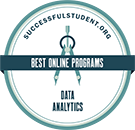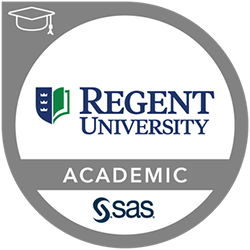
M.S. in Business Analytics
Turn Big Data into a Bold Career Move With an MSBA Degree
Regent’s Master of Science in Business Analytics (MSBA) degree gives you comprehensive training in one of the fastest-growing fields. We emphasize ethics, strategies to protect data integrity, and upholding the privacy of individuals and organizations. For those already working in business analytics, the program will fill important gaps in your technical and soft skills needed for career advancement into senior positions.
ACCELERATE YOUR INCOME
Leverage your marketability in the face of a data analyst shortage – and command a six-figure salary.
BECOME A STRATEGIC DECISION-MAKER
Mine big data to make effective business decisions that improve the performance of your organization.
BUILD IN-DEMAND SKILLS THROUGH THE MSBA PROGRAM
Learn how to transform large, unstructured data sets into deliverables that drive value and create competitive advantage.
You’ll gain expertise in business processes, high-level mathematics, computer science and statistics, predictive analytics, data mining, optimization, risk analysis and data visualization – all from a biblical worldview. On completing BAN630 Predictive Analytics (3) and BAN635 Data Mining (3) courses, you will also earn a digital SAS badge indicating a Tier 1 SAS Academic Specialization.

|
After completing this Master’s in Business Analytics online, you will be able to:
- Provide data-driven leadership across a wide variety of industries and functions, including marketing, finance, operations management, retail, manufacturing, banking and healthcare.
- Present data and predictions using top industry tools and foundational analytic concepts.
- Analyze best practices for corporate data storage and handling.
- Apply the use of modern analytical software, algorithms and methodologies through hands-on experience.
Career Opportunities
- Database Analyst
- SAS Programmer
- Business Analytics Expert
- Statistician
- Security Analyst
- Fraud/Risk Manager
Development of a deep understanding of the organization, positions, purpose, methods, informational processes, and decision-making mechanisms of the corporation.
The ethical conduct of business organizations as specifically related to the gathering, storage, analysis, dissemination, and use of public and private data.
Survey of central issues related to corporate data storage and handling, and the role and value of data analytics in parsing large volumes of complex multi-source data to meet the decision-making needs of contemporary organizations.
The fundamentals of statistical exploration and visualization techniques, including descriptive statistics and probability distributions, inferential statistics, parametric and non-parametric hypothesis tests and regression analysis.
Hands-on use of modern analytical software, algorithms, and methodologies to solve discrete real-world case studies as key aids to rational decision-making in organizations.
Introduction to technologies, principles, and activities involved in corporate data management, primarily data warehousing.
Covers foundational analytics concepts using selected industry tools, eg. AZURE, and methods for interpreting business requirements, describing, summarizing, and presenting data, and making predictions using statistical analysis.
Techniques to intelligently extract and analyze useful information stored in large data sets using machine learning algorithms such as Locality Sensitive Hashing (LSH), web analytics and social network analysis, decision trees and their applications in business intelligence, are covered.
Introduction to R (an open-source programming language for statistics and graphics), widely used within corporations, non-profits, and government, and related languages.
The admissions committee will consider the following criteria:
- Academic achievement
- Vision clarity and alignment with program outcomes
- Writing quality
- Leadership experience
2020-2021 Semester Check-In Deadlines:
All new students are expected to check-in for the semester 2 weeks prior to the session start date. Students should apply, be accepted, enroll in their first courses, and confirm a plan to pay for their courses prior to this date.
| Session | Semester Check-In | Session Start Date |
| Session A | Friday, August 14 | Monday, August 24 |
| Session M | Friday, September 11 | Monday, September 21 |
| Session B | Friday, October 16 | Monday, October 26 |
| Session C | Tuesday, January 5 | Monday, January 11 |
| Session T | Friday, January 29 | Monday, February 8 |
| Session D | Friday, March 5 | Monday, March 15 |
| Session E | Friday, April 30 | Monday, May 10 |
| Session F | Friday, June 11 | Monday, June 21 |
Prerequisites:
Master’s applicants must:
- Hold a bachelor’s degree from a regionally accredited institution or an equivalent degree from a foreign institution, as evaluated by a credential evaluating agency.
- Submit all application materials such that they are received by the application deadline. Admission interviews are by invitation only and may be requested.
Application Process:
1. Complete Your Online Application
Note: If you are unable to complete our application due to a disability, please contact our Admissions Office for assistance.
2. Pay Your $50 Application Fee
Pay the $50 nonrefundable application fee by check or money order mailed to Regent University, Enrollment Support Services, 1000 Regent University Drive, Virginia Beach, VA 23464.
3. Submit your Unofficial College Transcripts*
Unofficial transcripts from a U.S.-based school, indicating successful completion of a bachelor’s degree program, can be used for an admissions decision. Submit your unofficial transcript to apply@regent.edu using the subject line: SBL Master’s Application Pieces.
Non-U.S. transcripts must be evaluated by an NACES-approved company. See the International Admissions Checklist for details.
*Upon conditional acceptance to the program by review of unofficial transcripts, Regent University will attempt to obtain your official transcripts from your U.S. degree-granting institution, which indicate successful completion of a bachelor’s degree. We will notify you if your previous institution will not release transcripts directly to us.
4. Complete an Admissions Questionnaire Regarding Your Professional Goals and Interests
5. Submit Your Government-Issued ID
To ensure academic integrity, Regent University requires a copy of a government-issued ID. Please email a scanned copy or photograph of it to apply@regent.edu with the subject line: Government ID.
6. International Applicants
Visit the International Student Admissions page for additional admission requirements and to determine if you qualify as an international student.
Note: All items submitted as part of the application process become the property of Regent University and cannot be returned.
2019-20 Tuition Rates
| Degree Level / Program | Cost Per Credit Hour |
|---|---|
M.S. in Business Analytics | $675 per credit (In-state & Out-of-state) |
Student Fees Per Semester
| Enrollment Deposit | $100 |
| University Services Fee (Online Students) | $550 |
| RU Library Course Fee | $50 (one-time fee) |
2020-21 Tuition Rates
| Degree Level / Program | Cost Per Credit Hour |
|---|---|
M.S. in Business Analytics | $675 per credit (In-state & Out-of-state) |
Student Fees Per Semester
| Enrollment Deposit | $100 |
| University Services Fee (Online Students) | $600 |
| RU Library Course Fee | $50 (one-time fee) |
*Rates are subject to change at any time. The per-credit-hour tuition rate is for SBL master’s-level courses only. Concentration courses taken from other Regent schools are charged at that school’s tuition rate.
SAS Badge

The Regent University School of Business & Leadership Master of Science in Business Analytics (MSBA) program emphasizes ethics, strategies to protect data integrity, and the upholding of privacy of individuals and organizations. For those already working in business analytics, the program fills important gaps in the technical and soft skills needed for career advancement into senior data analytics positions. In partnership with SAS – the recognized analytics leader and trusted analytics powerhouse – students who successfully complete BAN630 Predictive Analytics (3) and BAN635 Data Mining (3) will be awarded a digital SAS badge indicating a Tier 1 SAS Academic Specialization. This digital badge can be used in email signatures or digital résumés, and on social media sites such as LinkedIn, Facebook and Twitter. The digital image contains verified metadata that describes individuals’ qualifications and the process required to earn them. SAS’ digital badging platform provides:
- Web-enabled version of credential that can be shared online.
- Labor market insights that connect skills to jobs.
- Trusted method for real-time credential verification.
- B.S. in Accounting
- B.S. in Business – Accounting
- B.S. in Business Analytics
- Doctor of Strategic Leadership (DSL)
- DSL – Individualized
- DSL – Strategic Foresight
- DSL – Strategic Leadership
- M.A. in Campaigns & Political Leadership – Information Studies/Data Analytics
- M.A. in Financial Planning & Law
- M.A. in Organizational Leadership
- M.A. in Organizational Leadership – Interdisciplinary Studies
- M.A. in Organizational Leadership – Leadership Coaching & Mentoring
- M.A. in Organizational Leadership – Social Entrepreneurship
- M.A. in Product Management
- MBA – Accounting
- MBA – Entrepreneurship
- MBA – Finance & Investing
- MBA – General Management
- MBA – Global Business Leadership & Communication
- MBA – Innovation Management
- MBA – Leadership
- MBA – Marketing
- MBA – Master of Business Administration
- MBA – Master of Business Administration (Accelerated)
- MBA – Small Business Technology Management
- MBA – Social Entrepreneurship
- M.S. in Health Information Systems Administration
- Ph.D. in Organizational Leadership – Entrepreneurial Leadership

